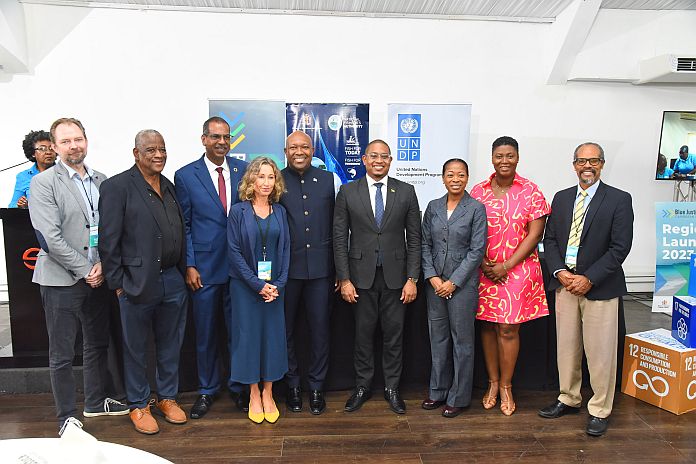KINGSTON, Jamaica – The Caribbean, location of the world’s first Blue Justice Hub, scored another first in its efforts to advance regional cooperation to address organized crime in the fisheries sector, with an inaugural regional meeting and first workshop training in Kingston last week.
Supported by the government of Norway and the United Nations Development Programme (UNDP) through the Blue Justice Initiative, Blue Justice Hubs help vulnerable regions build effective inter-agency cooperation on organized transnational fisheries crime in-country and regionally.
The inaugural meeting and workshop, also marked by a regional launch, follows an international launch in Copenhagen in March, and brought together fisheries analysts, senior government ministers and officials for national updates, introduction to the community’s online digital portal and other important discussions.
Jamaica’s minister of agriculture, fisheries and mining, Floyd Green said the government is committed to providing the requisite resources to support the regional Hub to create impact. Green noted that the Hub’s access to the digitally powered Blue Justice Community enables Jamaica to “use the digital tools afforded through automatic identification systems, radar and satellite technologies to support a wide array of open-source resources to … detect and analyse suspicious activities that are in contravention of our laws.” Green said the Hub will also support the detection identification, interdiction, and prosecution of fisheries crimes.
Minister without portfolio in the ministry of economic growth and job creation, senator Matthew Samuda, underscored the importance of initiatives like the Blue Justice Caribbean Hub for securing the prospects of a sustainable ocean economy.
The minister said that the ocean provides an amazing opportunity, through the right mix of protection, policies, oversight, and enforcement which promises to yield significant economic gains for Jamaica. Samuda pointed out that Jamaica’s key economic drivers – tourism, fisheries, shipping, and logistics services – are dependent on a healthy ocean and committed to working with the National Fisheries Authority (NFA) to ensure that protection targets with respect to Jamaica’s EEZ (Exclusive Economic Zone) are met by 2030.
Minister of agriculture, forestry and fisheries, St Vincent and the Grenadines, Saboto Caesar said now that the Hub has been established, the region is called to action.

Caesar commended the Caribbean Regional Fisheries Mechanism (CRFM), the government of Jamaica as the Hub-host, and the Norwegian government for their leadership and committed to tabling the issue within the Organization of Eastern Caribbean States (OECS) grouping with a view to full participation in the Blue Justice Initiative.
Deputy director general, Norwegian ministry of trade, industry and fisheries, Olav Norheim said members of the Blue Justice Initiative (BJI) have a common understanding that transnational organized crime in the global fishing economy has a serious effect on the economy, distorts markets, harms the environment, and undermines human rights. Norheim congratulated the Caribbean on its latest milestone in convening its inaugural meeting and training and stressed the importance of working together through common understanding as the path to success.
Through intelligence sharing, knowledge adoption, improved awareness and coordinated law-enforcement efforts, the region will create a “formidable force” against those who seek to exploit Caribbean oceans and its resources unlawfully, declared Executive Director, CRFM, Milton Haughton. “The establishment of this hub underscores the regional determination to address these challenges head-on with a united front and a comprehensive, coordinated approach,” Haughton stated.
Ava Whyte-Anderson, officer in charge/assistant resident representative from UNDP Jamaica, emphasized the importance of bolstering capacities to address fisheries crime in order to reinforce strategic interests in harnessing the Blue Economy for sustainable economic growth and livelihoods. Anderson called the Blue Justice Initiative’s digitally powered Blue Justice Community a stellar example of how UNDP intends to leverage digital transformation to underpin transformative actions that improve the quality of people’s lives and livelihoods.
UNDP regional technical specialist for Water, Oceans, Ecosystems and Biodiversity, AnaMaria Nunez said the Blue Justice Hub in the Caribbean is pivotal to underscoring UNDP’s support for interventions that enable sustainable use of natural resources. Nunez said Small Island Developing States (SIDS) remain a priority of the UNDP as fisheries play a leading role in supporting lives and livelihoods and are critical to advancing human development through a sustainable and fair blue economy.
“The creation of the Blue Justice Caribbean hub is a testament to our shared commitment to address food security and the growth of the Blue Economy in the region. Our collaboration with the Norwegian Blue Justice Initiative and UNDP’s Blue Resilience project is essential for fostering strategic inter-agency collaborations that benefit all Member States, in addressing crime that threatens the fishing industry” said Dr Gavin Bellamy, CEO of the NFA Jamaica.
The Blue Justice Caribbean Hub (BJCH) emerges as a direct response to the CRFM Ministerial Resolution No. MC 15(6) of 2021 which emphasizes regional support for the International Declaration on Transnational Organized Crime in the Global Fishing Industry (Copenhagen Declaration) and the Norwegian Blue Justice Initiative. These collective efforts underscore the urgency of cooperative action to safeguard food security, marine ecosystems, and uphold the rule of law amidst challenges posed by illegal fishing and fisheries crime in the Caribbean region.
Jamaica serves as the host of the Blue Justice Caribbean Hub, with the National Fisheries Authority as its focal point.





